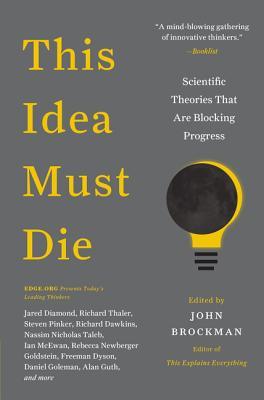Paul Saffo: The Illusion of Scientific Progress
The breathtaking advance of scientific discovery has the unknown on the run. Not so long ago, the Creation was 8,000 years old and Heaven hovered a few thousand miles above our heads. Now Earth is 4.5 billion years old and the observable Universe spans 92 billion light years. Pick any scientific field and the story is the same, with new discoveries—and new life-touching wonders—arriving almost daily. Like Pope, we marvel at how hidden Nature is revealed in scientific light.
Our growing corpus of scientific knowledge evokes Teilhard de Chardin's arresting metaphor of the noosphere, the growing sphere of human understanding and thought. In our optimism, this sphere is like an expanding bubble of light in the darkness of ignorance.
Our optimism leads us to focus on the contents of this sphere, but its surface is more important for it is where knowledge ends and mystery begins. As our scientific knowledge expands, contact with the unknown grows as well. The result is not merely that we have mastered more knowledge (the sphere's volume), but we have encountered an ever-expanding body of previously unimaginable mysteries. A century ago, astronomers wondered whether our galaxy constituted the entire universe; now they tell us we probably live in an archipelago of universes.
Notes:
Folksonomies: scientific progress progress
Taxonomies:
/technology and computing/consumer electronics/camera and photo equipment/telescopes (0.550227)
/science/physics (0.372309)
/science (0.293770)
Keywords:
observable Universe spans (0.930129 (neutral:0.000000)), new life-touching wonders—arriving (0.864731 (positive:0.233384)), scientific knowledge (0.766494 (positive:0.692406)), sphere (0.674708 (positive:0.651241)), breathtaking advance (0.646551 (positive:0.763687)), Paul Saffo (0.617976 (neutral:0.000000)), arresting metaphor (0.617882 (positive:0.754714)), scientific discovery (0.599741 (positive:0.763687)), Scientific Progress (0.597581 (positive:0.763687)), unimaginable mysteries (0.593887 (negative:-0.593001)), ever-expanding body (0.589285 (negative:-0.593001)), scientific field (0.561249 (positive:0.282615)), human understanding (0.559578 (positive:0.665908)), new discoveries—and (0.558187 (positive:0.233384)), scientific light (0.537745 (neutral:0.000000)), entire universe (0.525518 (positive:0.226404)), optimism (0.411342 (positive:0.546658)), unknown (0.371140 (positive:0.656256)), noosphere (0.311692 (positive:0.754714)), Chardin (0.294085 (positive:0.754714)), Teilhard (0.291824 (positive:0.754714)), ignorance (0.290895 (neutral:0.000000)), Illusion (0.287499 (positive:0.763687)), universes (0.282385 (neutral:0.000000)), archipelago (0.280600 (neutral:0.000000)), heads (0.277737 (negative:-0.315191)), bubble (0.274657 (neutral:0.000000)), run (0.273951 (positive:0.763687)), Creation (0.273804 (negative:-0.315191)), miles (0.273443 (negative:-0.315191))
Entities:
Teilhard de Chardin:Facility (0.916414 (positive:0.754714)), Paul Saffo:Person (0.849610 (neutral:0.000000)), Pope:Person (0.689136 (neutral:0.000000)), 92 billion light years:Quantity (0.689136 (neutral:0.000000)), 4.5 billion years:Quantity (0.689136 (neutral:0.000000)), thousand miles:Quantity (0.689136 (neutral:0.000000)), 8,000 years:Quantity (0.689136 (neutral:0.000000))
Concepts:
Pierre Teilhard de Chardin (0.959449): dbpedia | freebase | yago
Noosphere (0.896089): dbpedia | freebase | yago
Observable universe (0.824571): dbpedia | freebase
Galaxy (0.822201): dbpedia | freebase | opencyc
Universe (0.767863): dbpedia | freebase
Nature (0.757001): dbpedia | freebase | opencyc
Science (0.749630): dbpedia | freebase | opencyc
Scientific method (0.719176): dbpedia | freebase





